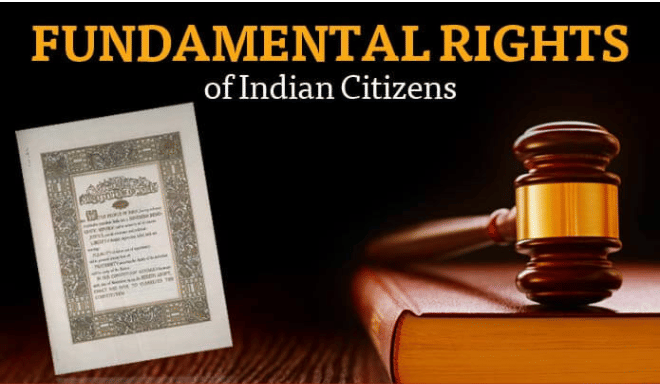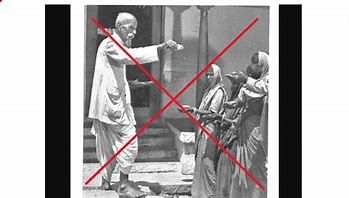Fundamental Rights (Article 12 - 35)- 1 | Famous Books for UPSC Exam (Summary & Tests) PDF Download
INTRODUCTION
- The fundamental rights were included in the constitution because they were considered essential for the development of the personality of every individual and to preserve human dignity.
- All people, irrespective of race, religion, caste or sex, have been given the right to move the Supreme Court and the High Courts for the enforcement of their fundamental rights. There are seven categories of Fundamental Rights (FR) which are covered from Articles 12-35.

ARTICLE 12: DEFINITION
- In this Part, unless the context otherwise required, “the State” includes the Governmental and Parliament of India and the Government and the Legislature of each of the States and all local or other authorities within the territory of India or under the control of the Government of India.
ARTICLE 13: LAWS INCONSISTENT WITH OR IN DEROGATION OF THE FUNDAMENTAL RIGHTS
(1) All laws in force in the territory of India immediately before the commencement of this Constitution, in so far as they are inconsistent with the provisions of this Part, shall, to the extent of such inconsistency, be void.
(2) The State shall not make any law which takes away or abridges the rights conferred by this Part and any law made in contravention of this clause shall, to the extent of the contravention, be void.
(3) In this article, unless the context otherwise required, –
- “Law” includes any Ordinance, order, bye-law, rule, regulation, notification, custom or usage having in the territory of India the force of law;
- “Laws in force” includes laws passed or made by a Legislature or other competent authority in the territory of India before the commencement of this Constitution and not previously repealed, notwithstanding that any such law or any part thereof may not be then in operation either at all or in particular areas.
(4) Nothing in this article shall apply to any amendment of this Constitution made under article 368.
ARTICLE 14: EQUALITY BEFORE LAW
The State shall not deny to any person equality before the law or the equal protection of the laws within the territory of India.
ARTICLE 15: PROHIBITION OF DISCRIMINATION ON GROUNDS OF RELIGION, RACE, CASTE, SEX OR PLACE OF BIRTH
(1) The State shall not discriminate against any citizen on grounds only of religion, race, caste, sex, place of birth or any of them.
(2) No citizen shall, on the ground only of religion, race, caste, sex, place of birth or any of them, be subject to any disability, liability, restriction or condition about –
- Access to shops, public restaurants, hotels and places of public entertainment; or
- The use of wells, tanks, bathing ghats, roads and places of public resort maintained whole or partly out of State funds or dedicated to the use of the general public.
(3) Nothing in this article shall prevent the State from making any special provision for women and children.
(4) Nothing in this article or in clause (2) or Article 29 shall prevent the State from making any special provision for the advancement of any socially and educationally backward classes of citizens or the Scheduled Castes and the Scheduled Tribes.
ARTICLE 16: EQUALITY OF OPPORTUNITY IN MATTERS OF PUBLIC EMPLOYMENT
(1) There shall be equality of opportunity for all citizens in matters relating to employment or appointment to any office under the State.
(2) No citizen shall, on grounds only of religion, race, caste, sex, descent, place of birth, residence or any of them, be ineligible for, or discriminated against in respect of, any employment or office under the State.
(3) Nothing in this article shall prevent Parliament from making any law prescribing, in regard to a class or classes of employment or appointment to an office under the Government of, or any local or other authority within, a State or Union territory, any requirement as to residence within that State or Union territory prior to such employment or appointment.
(4) Nothing in this article shall prevent the State from making any provision for the reservation of appointments or posts in favour of any backward class of citizens which, in the opinion of the State, is not adequately represented in the services under the State.
(4A) Nothing in this article shall prevent the State from making any provision for reservation in matters of promotion to any class or classes of posts in the services under the State in favour of the Scheduled Castes and the Scheduled Tribes which, in the opinion of the State, are not adequately represented in the services under the State.
(5) Nothing in this article shall affect the operation of any law which provides that the incumbent of an office in connection with the affairs of any religious or denominational institution or any member of the governing body thereof shall be a person professing a particular religion or belonging to a particular denomination.
ARTICLE 17 : ABOLITION OF UNTOUCHABILITY
“Untouchability” is abolished and its practice in any form is forbidden. The enforcement of any disability arising out of “Untouchability” shall be an offence punishable in accordance with law.
ARTICLE 18 : ABOLITION OF TITLES
(1) No title, not being a military or academic distinction, shall be conferred by the State.
(2) No citizen of India shall accept any title from any foreign State.
(3) No person who is not a citizen of India shall, while he holds any office of profit or trust under the State, accept without the consent of the President any title from any foreign State.
(4) No person holding any office of profit or trust under the State shall, without the consent of the President, accept any present, emolument, or office of any kind from or under any foreign State.
ARTICLE 19 : PROTECTION OF CERTAIN RIGHTS REGARDING FREEDOM OF SPEECH, ETC.
(1) All citizens shall have the right –
- To freedom of speech and expression;
- To assemble peaceably and without arms;
- To form associations or unions;
- To move freely throughout the territory of India;
- To reside and settle in any part of the territory of India; and
- To practice any profession, or to carry on any occupation, trade or business.
(2) Nothing in sub-clause (a) of clause (1) shall affect the operation of any existing law, or prevent the State from making any law, in so far as such law imposes reasonable restrictions on the exercise of the right conferred by the said sub-clause in the interests of the sovereignty and integrity of India, the security of the State, friendly relations with foreign States, public order, decency or morality, or in relation to contempt of court, defamation or incitement to an offence.
(3) Nothing in sub-clause (b) of the said clause shall affect the operation of any existing law in so far as it imposes, or prevent the State from making any law imposing, in the interest of the sovereignty and integrity of India or public order, reasonable restrictions on the right conferred by the said sub-clause.
(4) Nothing in sub-clause (c) of the said clause shall affect the operation of any existing law in so far as it imposes, or prevent the State from making any law imposing, in the interests of the sovereignty and integrity of India or public order or morality, reasonable restrictions on the exercise of the right conferred by the said sub-clause.
(5) Nothing in sub-clause (d) and (e) of the said clause shall affect the operation of any existing law in so far as it imposes, or prevent the State from making any law imposing, reasonable restrictions on the exercise of any of the rights conferred by the said sub-clauses either in the interests of the general public or for the protection of the interests of any Scheduled Tribe.
(6) Nothing in sub-clause (g) of the said clause shall affect the operation of any existing law in so far as it imposes, or prevent the State from making any law imposing, in the interests of the general public, reasonable restrictions on the exercise of the right conferred by the said sub-clause, and, in particular, nothing in the said sub-clause shall affect the operation of any existing law in so far as it relates to, or prevent the State from making any law relating to –
- The professional or technical qualifications necessary for practising any profession or carrying on any occupation, trade or business, or
- The carrying on by the State, or by a corporation owned or controlled by the State, of any trade, business, industry or service, whether to the exclusion, complete or partial, of citizens or otherwise.
ARTICLE 20 : PROTECTION IN RESPECT OF CONVICTION FOR OFFENCES
(1) No person shall be convicted of any offence except for violation of a law in force at the time of the commission of the act charged as an offence, not be subjected to a penalty greater than that which might have been inflicted under the law in force at the time of the commission of the offence.
(2) No person shall be prosecuted and punished for the same offence more than once.
(3) No person accused of any offence shall be compelled to be a witness against himself.
ARTICLE 21 : PROTECTION OF LIFE AND PERSONAL LIBERTY
No person shall be deprived of his life or personal liberty except according to procedure established by law.
Article 21A: Right to education
The State shall provide free and compulsory education to all children of the age of six to fourteen years in such manner as the State may, by law, determine.
ARTICLE 22 : PROTECTION AGAINST ARREST AND DETENTION IN CERTAIN CASES
(1) No person who is arrested shall be detained in custody without being informed, as soon as may be, of the grounds for such arrest nor shall he be denied the right to consult, and to be defended by, a legal practitioner of his choice.
(2) Every person who is arrested and detained in custody shall be produced before the nearest magistrate within a period of twenty-four hours of such arrest excluding the time necessary for the journey from the place of arrest to court of the magistrate and no such person shall be detained in custody beyond the said period without the authority of a magistrate.
(3) Nothing in clauses (1) and (2) shall apply –
- To any person who for the time being is an enemy alien; or
- To any person who is arrested or detained under any law providing for preventive detention.
(4) No law providing for preventive detention shall authorize the detention of a person for a longer period than three months unless –
- An Advisory Board consisting of persons who are, or have been, or are qualified to be appointed as, Judges of a High Court has reported before the expiration of the said period of three months that there is in its opinion sufficient cause for such detention:
Provided that nothing in this sub-clause shall authorise the detention of any person beyond the maximum period prescribed by any law made by Parliament under sub-clause (b) of clause (7); or - Such person is detained in accordance with the provisions of any law made by Parliament under sub-clauses (a) and (b) of clause (7).
(5) When any person is detained in pursuance of an order made under any law providing for preventive detention, the authority making the order shall, as soon as may be, communicate to such person the grounds on which the order has been made and shall afford him the earliest opportunity of making a representation against the order.
(6) Nothing in clause (5) shall require the authority making any such order as is referred to in that clause to disclose facts which such authority considers to be against the public interest to disclose.
(7) Parliament may by law prescribe –
- The circumstances under which, and the class or classes of cases in which, a person may be detained for a period longer than three months under any law providing for preventive detention without obtaining the opinion of an Advisory Board in accordance with the provisions of sub-clause (a) of clause (4);
- The maximum period for which any person may in any class or classes of cases be detained under any law providing for preventive detention; and
- The procedure to be followed by an Advisory Board in an inquiry under sub-clause (a) of clause (4).
|
743 videos|1444 docs|633 tests
|
FAQs on Fundamental Rights (Article 12 - 35)- 1 - Famous Books for UPSC Exam (Summary & Tests)
| 1. What is the definition of Article 12? |  |
| 2. How does Article 13 address laws inconsistent with or in derogation of fundamental rights? |  |
| 3. What does Article 14 ensure regarding equality before the law? |  |
| 4. How does Article 15 prohibit discrimination on grounds of religion, race, caste, sex, or place of birth? |  |
| 5. What does Article 16 ensure regarding equality of opportunity in matters of public employment? |  |


























